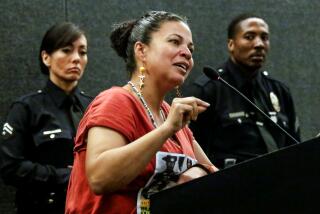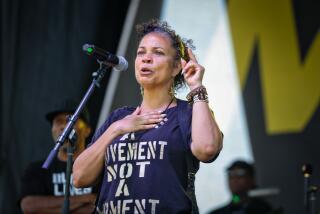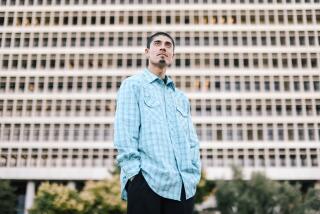Rallying Round the Wrong Cause : Mumia Abu-Jamal’s supporters should consider that he never denied shooting the officer.
- Share via
PHILADELPHIA — Let me get this straight. Mumia Abu-Jamal is a radical who believes that the police have no legitimate authority. One night in 1981, he came upon his brother in a struggle with a Philadelphia policeman. Armed with a revolver, Abu-Jamal raced across the street toward the pair. And then, somebody else shot Officer Daniel Faulkner.
No, that is not a plot line that any movie fan would find believable. Yet that’s the line that the public is being sold by the publicity juggernaut that is trying to portray Jamal as an innocent man who is on Pennsylvania’s Death Row for a crime he didn’t commit. From Berlin to Bel-Air, leftists, writers and actors are peddling the line that Abu-Jamal was not the man who fatally shot Faulkner on Dec. 9, 1981.
It’s a beguiling line and Jamal is a beguiling character. With his dreadlocks and granny glasses, he looks a lot like the singer Bobby McFerrin. And his “Live From Death Row” book of essays makes him appear to be a reasonable type, certainly not the sort of guy who would shoot a fallen cop between the eyes from a distance of 18 inches.
But there are several problems with the pro Abu-Jamal argument. For one, his pistol. It was registered to him and it was found at his feet with five empty cartridges in it after the shooting. Officer Faulkner lay nearby with two bullet wounds. Abu-Jamal was sitting on a curb with an empty shoulder holster and one bullet wound. Faulkner’s gun had one spent cartridge. Three witnesses said they saw Abu-Jamal fire the fatal shots.
But those problems pale before the biggest absurdity of the case, one that has--amazingly--gone unnoticed by the journalists covering the case: Abu-Jamal has never denied shooting Faulkner. A check of newspaper databases and the trial record reveals no such denial. So I recently asked his lead attorney, Leonard Weinglass, to cite one occasion on which Abu-Jamal has denied being the triggerman. He couldn’t. Instead, he cited statements by Abu-Jamal that he is “not guilty” of the crime. But one can be “not guilty” of a crime for a variety of reasons, among them insanity and self-defense. When I pressed Weinglass further for any statement by Abu-Jamal that he simply had not shot Faulkner, Weinglass was unable to provide one.
Which brings up another interesting question: In the event Abu-Jamal wins a retrial, will the defense stick to the theory that a second gunman shot Faulkner? That brought a rather testy “no comment” from Weinglass.
The Abu-Jamal defense is sullying the reputation of both Philadelphia and the United States with its contentions that he was unjustly convicted for a crime committed by someone else. But they are unwilling to commit to that theory in a possible retrial.
Why not? A logical suspicion is that if a retrial occurs, Weinglass might abandon the second-gunman theory. Instead, he’d admit the obvious: that Abu-Jamal shot Faulkner. He could then argue that Abu-Jamal was trying to prevent a Rodney King-like beating of his brother. Such a tactic would greatly lower the hurdle for the defense. Acquittal is no longer necessary. With a verdict of voluntary manslaughter or third-degree murder, Abu-Jamal could walk out of court based on time served.
You certainly can’t blame his defense team for trying. But in the meantime, they’re making fools of all those New York writers and Hollywood stars who have bought this absurd second-gunman theory. In fact, the trial was possibly the most open-and-shut case in Philadelphia history.
While Abu-Jamal stays mum, his defenders offer up mystery-gunman theories to journalists covering the hearing. Maybe the mystery gunman was in his brother’s car, maybe the brother was the actual gunman, maybe some Good Samaritan showed up at the crucial moment, wrestled the gun from Abu-Jamal’s hands, shot Faulkner and disappeared into the night.
In their efforts to give both sides equal treatment, the journalists covering the case have been recycling these scenarios as if they had some validity. Instead they should insist that Abu-Jamal give his version of exactly what happened that night. Abu-Jamal has been convicted. The burden of proof is no longer on the government, but on him. One of Abu-Jamal’s favorite sayings is, “The truth shall set you free.”
So let’s hear it.
More to Read
Sign up for Essential California
The most important California stories and recommendations in your inbox every morning.
You may occasionally receive promotional content from the Los Angeles Times.













